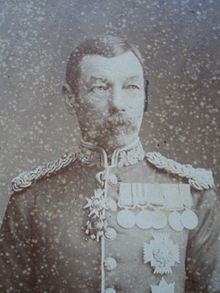Drury Drury-Lowe
Sir Drury Curzon Drury-Lowe | |
|---|---|
 General Sir Drury Curzon Drury-Lowe | |
| Birth name | Drury Curzon Holden |
| Born | 3 January 1830 Aston-on-Trent, Derbyshire |
| Died | 6 April 1908 (aged 78) Denby, England |
| Allegiance | |
| Service/ | |
| Years of service | 1854–1895 |
| Rank | Lieutenant-General |
| Unit | 17th Lancers (Duke of Cambridge's Own) |
| Commands held | Commander, 17th Lancers 1866–1878 Inspector of Cavalry at Aldershot 1885–1890 Colonel of the 17th Lancers 1892–1895 |
| Battles/wars | Crimean War (1855–1856): Battle of Chernaya River, Siege of Sevastopol, Indian Mutiny (1858–1859), Anglo-Zulu War (1879): Battle of Ulundi. Anglo-Egyptian War (1882). |
| Awards | GCB |
Lieutenant-General Sir Drury Curzon Drury-Lowe GCB (3 January 1830 – 6 April 1908) was a British Army officer.
Biography[edit]
He was born as Drury Curzon Holden[1] on 3 January 1830 at Aston Lodge in Aston-on-Trent when he was called Drury Curzon Holden. His father was William Drury Holden and he changed his name to Lowe when he inherited the Locko Park inheritance.[1]
He was educated privately at his home, Locko Park,[2] near Spondon in Derbyshire, before gaining a baccalaureate at Corpus Christi College, Oxford. He joined the 17th Lancers[3] in 1854 as a Cornet. He was commissioned a Lieutenant in November 1854 and Captain in November 1856.[1]
He served in the Crimean War at the Battle of Chernaya River and was at the Siege of Sevastopol when it fell. He also saw service in the Indian Mutiny in 1858–59. He purchased a commission as Major in 1862, and was promoted to Lieutenant-Colonel of the 17th Lancers in 1866.[4] Sometime between 1862 and 1867, he assumed the surname Drury-Lowe in place of Lowe.[1]
Drury-Lowe commanded the 17th Lancers for 12 years – most notably at the Battle of Ulundi,[5][6] the last pitched battle of the Anglo-Zulu War.[7] On 5 June 1879, he led the 17th Lancers into battle with Zulu irregulars as part of the Zungeni Mountain skirmish, during which his adjutant, Frederick John Cokayne Frith, was killed and the British had to withdraw.[8] According to Private Miles Gissop, who served in the regiment, Drury-Lowe claimed: "You are all right men. You are all right, they are aiming over your heads" only a moment before a Zulu bullet struck Frith in the heart.[9]
Drury-Lowe was appointed Companion of the Order of the Bath in 1879. In the 1882 Anglo-Egyptian War, he received the surrender of Urabi Pasha.[10] He was publicly thanked in the House of Commons, and knighted on 18 November 1882.[1] He was Inspector of Cavalry at Aldershot from 1885 to 1890.[11] He was promoted to Lieutenant-General in 1890. He became Colonel of the 17th Lancers in 1892.[1]
Last years[edit]
Drury-Lowe retired in 1895 and was awarded the Knight Grand Cross of the Order of the Bath, and then resided at Keydell House, Horndean,[12] occasionally writing to The Times.[13] He died on 6 April 1908; his widow died on 17 January 1931.[14]
Notes[edit]
- ^ a b c d e f "Biography of Sir Drury Curzon Drury-Lowe (1830–1908)". University of Nottingham. Retrieved 2 November 2009.
- ^ "Locko Park". 26 August 2014. Archived from the original on 22 February 2007.
- ^ "Regimental web-site". Archived from the original on 22 March 2007.
- ^ ffrench Blake, Robert Lifford Valentine, 17/21st Lancers (Famous Regiments), London, Hamish Hamilton, 1968; ISBN 978-0-241-01543-8
- ^ "South Africa Holiday: Battle of Ulundi - 1879 (information for British Tourists in South Africa)". southafricaholiday.org.uk. n.d. Archived from the original on 26 April 2018. Retrieved 26 April 2018.
- ^ Image of young Drury-Lowe, rorkesdriftvc.com; accessed 24 January 2022.
- ^ The Field Guide to the Anglo-Zulu War by J. Laband & P. Thompson (1999 Scottsville University of Natal Press); ISBN 0869809512
- ^ Greaves, Adrian (2012). Crossing the Buffalo: The Zulu War of 1879. London: Orion. pp. 299–300. ISBN 978-1-4091-2572-3.
- ^ Clammer, David (1980). "The Recollections of Miles Gissop: With the 17th Lancers in Zululand". Journal of the Society for Army Historical Research. 58 (234): 78–92. ISSN 0037-9700. JSTOR 44223296 – via JSTOR.
- ^ "EGYPT—TRIAL OF ARABI PASHA. (Hansard, 6 November 1882)". api.parliament.uk.
- ^ The DNB (Supplement 1901–1911 Volume 1 Abbey-Eyre) notes he "made no major innovations": Drury Lowe was, first and last a field soldier.
- ^ Horndean 2000 Singleton,B. (1999, Horndean, Horndean Parish Council
- ^ The First Cuckoo:letters to The Times, 1900–1980 (Gregory, K. Ed.) London, George Allen & Unwin, 1981 ISBN 0048080314 Letter written 8 May 1903 arguing for the retention of the lance.
- ^ Havant Museum, Local History Collection, Horndean Collection, Vol 4 (Keydell) Autobiographical notebook of Margaret Strange, Keydell resident (Farmhouse) 1928–53.
- 1830 births
- 1908 deaths
- Military personnel from Derbyshire
- 17th Lancers officers
- People from Aston-on-Trent
- Alumni of Corpus Christi College, Oxford
- British Army lieutenant generals
- Knights Grand Cross of the Order of the Bath
- British Army personnel of the Crimean War
- British military personnel of the Indian Rebellion of 1857
- British Army personnel of the Anglo-Zulu War
- British Army personnel of the Anglo-Egyptian War
- People from Horndean
